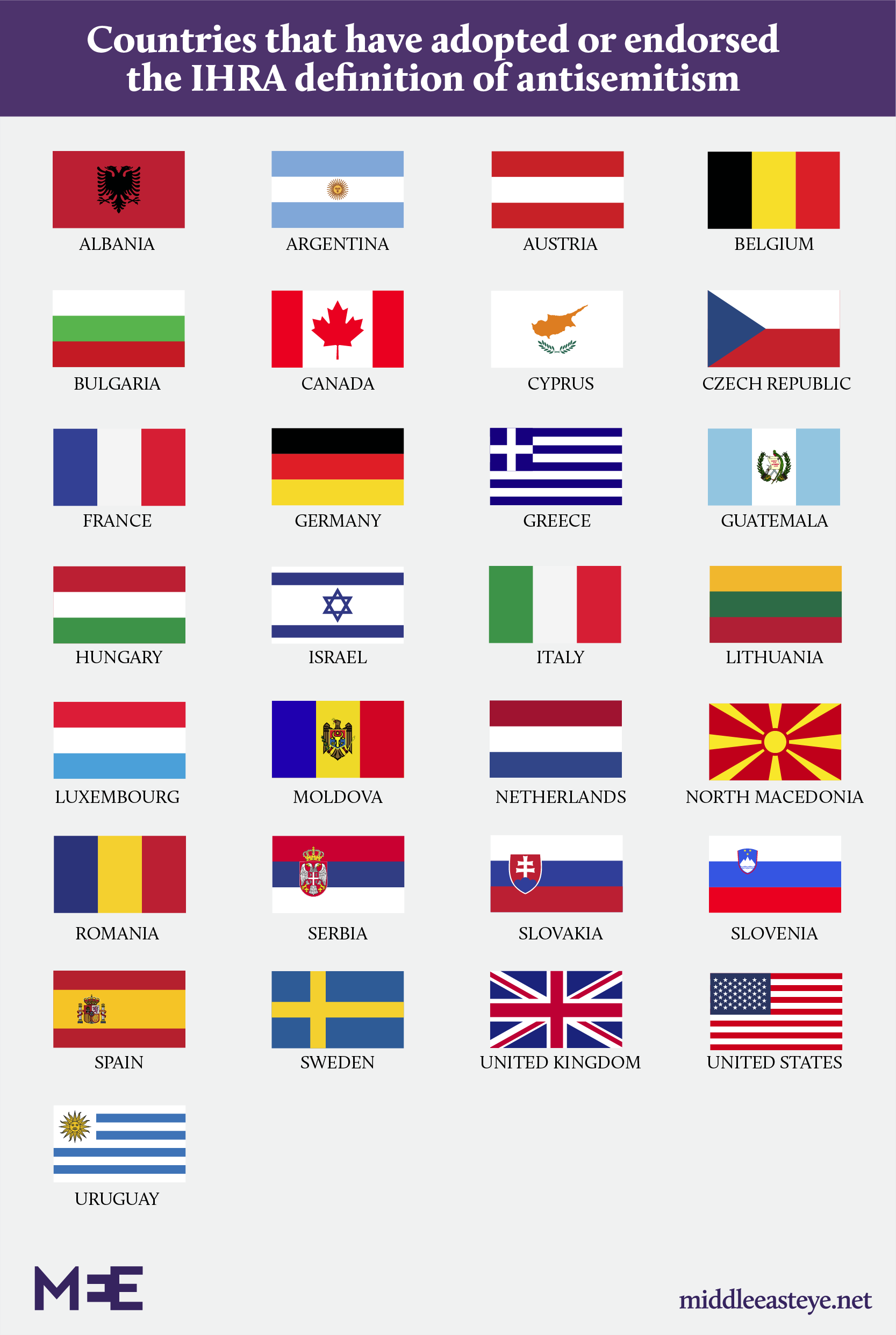Antisemitism: What is the IHRA definition and why is it controversial?

Championed by various Jewish and pro-Israeli groups, advocates for the International Holocaust Remembrance Alliance's definition of antisemitism say it has become a benchmark used by many governments, NGOs, and public institutions to identify acts of anti-Jewish hatred.
Twenty-nine countries have so far adopted or endorsed the definition, along with many political parties and public institutions, including both the Conservative and Labour parties in the UK.
But some institutions have resisted adopting the definition. In the UK, universities have been warned they could lose government funding unless they adopt it - but many academics argue that the definition could undermine free speech on campuses. Legal experts have also said the definition could lead to a "curtailment of debate".
So why has the definition proven to be so controversial?
What is the IHRA definition of antisemitism?
The IHRA's working definition of antisemitism reads as follows:
"Antisemitism is a certain perception of Jews, which may be expressed as hatred toward Jews. Rhetorical and physical manifestations of antisemitism are directed toward Jewish or non-Jewish individuals and/or their property, toward Jewish community institutions and religious facilities."
The definition, which is non-legally binding, is accompanied by a list of 11 "illustrations" of antisemitism which the IHRA says are intended to "guide" it in its work.
These examples include making claims that Jews control the media and the economy, denying the Holocaust, and accusing Jews of being more loyal to Israel than their own countries.
Seven of the 11 examples include references to Israel. They include claiming that the existence of the state of Israel is a "racist endeavour", and "applying double standard [to Israel] by requiring of it a behaviour not expected or demanded of any other democratic nation".
How was it formed?
The definition was formulated in 2004 by antisemitism expert Kenneth Stern in collaboration with other academics for the American Jewish Committee, a Jewish advocacy organisation founded at the beginning of the 20th century and based in New York. It says its mission is "to enhance the well-being of the Jewish people and Israel, and to advance human rights and democratic values in the United States and around the world".
Stern said the definition was created specifically for European data collectors to help them monitor antisemitism. It was adopted by the European Union's Monitoring Centre on Racism and Xenophobia in 2005 to monitor antisemitism across Europe.
But after facing complaints of misuse, the centre's successor body, the Fundamental Rights Agency, dropped it in 2014.
The pro-Israel Simon Wiesenthal centre, headed by Mark Weitzman, later campaigned for the definition to be reintroduced via the IHRA.
What is the International Holocaust Remembrance Alliance?
The IHRA grew out of a task force established by Sweden, Britain and the US in 1998 to promote Holocaust education, research and remembrance.
Its membership today comprises 29 European countries plus Israel, the US, Canada, Australia and Argentina. IHRA policy is agreed at biannual meetings attended by delegates from each member country.
The adoption of the working definition of antisemitism was the outcome of one such plenary meeting in 2016 in Bucharest, Romania.
Problematic examples

Critics of the IHRA definition say that some of the accompanying examples conflate antisemitism with anti-Zionism, or criticism of historic and current policies that led to the creation of the state of Israel in 1948, the expulsion of hundreds of thousands of Palestinians from their homes in modern-day Israel, and continuing human rights abuses against Palestinians and occupation of Palestinians lands by Israel.
The definition has been used, for instance, as a pretext to ban pro-Palestine events at several UK universities.
When the University of Lancashire cancelled an Israeli Apartheid Week event, Weitzman described it as a "turning point in the struggle to curb the demonisation of the Jewish state at universities".
A senior Israeli diplomat from the Ministry of Foreign Affairs also called it a "minimalist definition" but admitted that the "essential definition in our eyes is the list of examples", while a senior figure at a leading American pro-Israel organisation went so far as to say that “essentially the definition is the examples”.
Attack on academic freedom?
In 2019, Stern, the original author, described his definition as not being "suitable" for university campuses and accused right-wing Jews of weaponising it in an op-ed for the Guardian.
During a US congressional hearing in 2018, he voiced his fear that the definition's application on US campuses would have a "chilling" effect on free speech.
His views have been echoed by academics across the world, including some Jewish lecturers at British universities.
In 2020, a year-long study into the IHRA definition by University College London also concluded that it created a "chilling effect" on campus.
It said the definition made students and staff "anxious" to discuss issues concerning Israel and Palestine. In February, academics at UCL called on the university to stop using the definition and replace it with something "fit for purpose".
Middle East Eye propose une couverture et une analyse indépendantes et incomparables du Moyen-Orient, de l’Afrique du Nord et d’autres régions du monde. Pour en savoir plus sur la reprise de ce contenu et les frais qui s’appliquent, veuillez remplir ce formulaire [en anglais]. Pour en savoir plus sur MEE, cliquez ici [en anglais].





